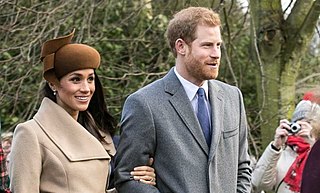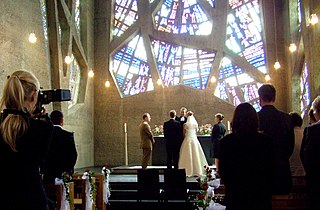Related Research Articles

Marriage, also called matrimony or wedlock, is a culturally and often legally recognised union between people called spouses. It establishes rights and obligations between them, as well as between them and their children, and between them and their in-laws. It is nearly a cultural universal, but the definition of marriage varies between cultures and religions, and over time. Typically, it is an institution in which interpersonal relationships, usually sexual, are acknowledged or sanctioned. In some cultures, marriage is recommended or considered to be compulsory before pursuing sexual activity. A marriage ceremony is called a wedding, while a private marriage is sometimes called an elopement.
When a person assumes the family name of their spouse, in some countries that name replaces the person's previous surname, which in the case of the wife is called the maiden name, whereas a married name is a family name or surname adopted upon marriage.

The House of Windsor is a British royal house, and currently the reigning house of the United Kingdom and the other Commonwealth realms. The royal house's name was inspired by the historic Windsor Castle estate. Since it was founded on 17 July 1917, there have been five British monarchs of the House of Windsor: George V, Edward VIII, George VI, Elizabeth II, and Charles III. The children and male-line descendants of Queen Elizabeth II and Prince Philip also genealogically belong to the House of Oldenburg since Philip was by birth a member of the Glücksburg branch of that house.
A prince consort is the husband of a monarch who is not a monarch in his own right. In recognition of his status, a prince consort may be given a formal title, such as prince. Most monarchies do not allow the husband of a queen regnant to be titled as a king because it is perceived as a higher title than queen, however, some monarchies use the title of king consort for the role.

A civil marriage is a marriage performed, recorded, and recognized by a government official. Such a marriage may be performed by a religious body and recognized by the state, or it may be entirely secular.

Duke of Sussex is a substantive title, one of several royal dukedoms in the Peerage of the United Kingdom. It is a hereditary title of a specific rank of nobility in the British royal family. It has been created twice and takes its name from the historic county of Sussex in England.

The Gender Recognition Act 2004 is an act of the Parliament of the United Kingdom that allows adults in the United Kingdom who have gender dysphoria to change their legal gender. It came into effect on 4 April 2005.

The Civil Partnership Act 2004 is an Act of the Parliament of the United Kingdom, introduced by the Labour government, which grants civil partnerships in the United Kingdom the rights and responsibilities very similar to those in civil marriage. Initially the Act permitted only same-sex couples to form civil partnerships. This was altered to include opposite-sex couples in 2019. Civil partners are entitled to the same property rights as married couples, the same exemption as married couples regarding social security and pension benefits, and also the ability to exercise parental responsibility for a partner's children, as well as responsibility for reasonable maintenance of one's partner and their children, tenancy rights, full life insurance recognition, next-of-kin rights in hospitals, and others. There is a formal process for dissolving civil partnerships, akin to divorce.

A dynastic union is a type of union in which different states are governed beneath the same dynasty, with their boundaries, their laws, and their interests remaining distinct from each other.

Marriage is available in England and Wales to both opposite-sex and same-sex couples and is legally recognised in the forms of both civil and religious marriage. Marriage laws have historically evolved separately from marriage laws in other jurisdictions in the United Kingdom. There is a distinction between religious marriages, conducted by an authorised religious celebrant, and civil marriages, conducted by a state registrar. The legal minimum age to enter into a marriage in England and Wales is 18 since 27 February 2023. Previously the minimum age of marriage was 16, with parental permission. This also applies to civil partnerships.
Interethnic marriage is a form of exogamy that involves a marriage between spouses who belong to different ethnic groups.

A marriage officiant or marriage celebrant is a person who officiates at a wedding ceremony.
Jure uxoris describes a title of nobility used by a man because his wife holds the office or title suo jure. Similarly, the husband of an heiress could become the legal possessor of her lands. For example, married women in England and Wales were legally incapable of owning real estate until the Married Women's Property Act 1882.
Arranged marriage is a type of marital union where the bride and groom are primarily selected by individuals other than the couple themselves, particularly by family members such as the parents. In some cultures, a professional matchmaker may be used to find a spouse for a young person.
Anti-miscegenation laws are laws that enforce racial segregation at the level of marriage and intimate relationships by criminalizing interracial marriage and sometimes, they also criminalize sex between members of different races.

The Succession to the Crown Act 2013 is an Act of the Parliament of the United Kingdom that altered the laws of succession to the British throne in accordance with the 2011 Perth Agreement. The Act replaced male-preference primogeniture with absolute primogeniture for those in the line of succession born after 28 October 2011, which means the eldest child, regardless of gender, precedes any siblings. The Act also repealed the Royal Marriages Act 1772, ended disqualification of a person who married a Roman Catholic from succession, and removed the requirement for those outside the first six persons in line to the throne to seek the Sovereign's approval to marry. It came into force on 26 March 2015, at the same time as the other Commonwealth realms implemented the Perth Agreement in their own laws.

Lesbian, gay, bisexual, and transgender (LGBT) persons in the British Overseas Territory of Akrotiri and Dhekelia enjoy most of the same rights as non-LGBT people.
Same-sex marriage has been legal in Akrotiri and Dhekelia since 3 June 2014. An Order in Council to legalise same-sex marriages was approved by the Privy Council of the United Kingdom on 28 April 2014 and came into effect on 3 June. However, this only applies if one of the parties to the marriage is a member of the British Armed Forces. The order does not apply to the local civil population residing in Akrotiri and Dhekelia. Military personnel have also been able to enter into civil partnerships since 2005.
Same-sex marriage has been legal in the British Antarctic Territory since 13 October 2016. A new marriage ordinance bringing territorial legislation in line with the law in force in England and Wales was proclaimed by Commissioner Peter Hayes on 13 October, legalising marriage by same-sex couples.
Same-sex marriage has been legal in South Georgia and the South Sandwich Islands since 13 March 2014, in accordance with the law in force in England and Wales, although the Foreign and Commonwealth Office only updated its travel advice website page to include a note about it in January 2018. South Georgia and the South Sandwich Islands, despite having no permanent population, was the first British Overseas Territory to recognise same-sex marriage.
References
- ↑ ONS well-being report reveals UK's happiness ratings retrieved 25 July 2012